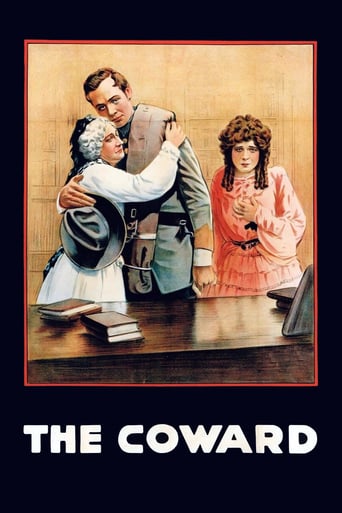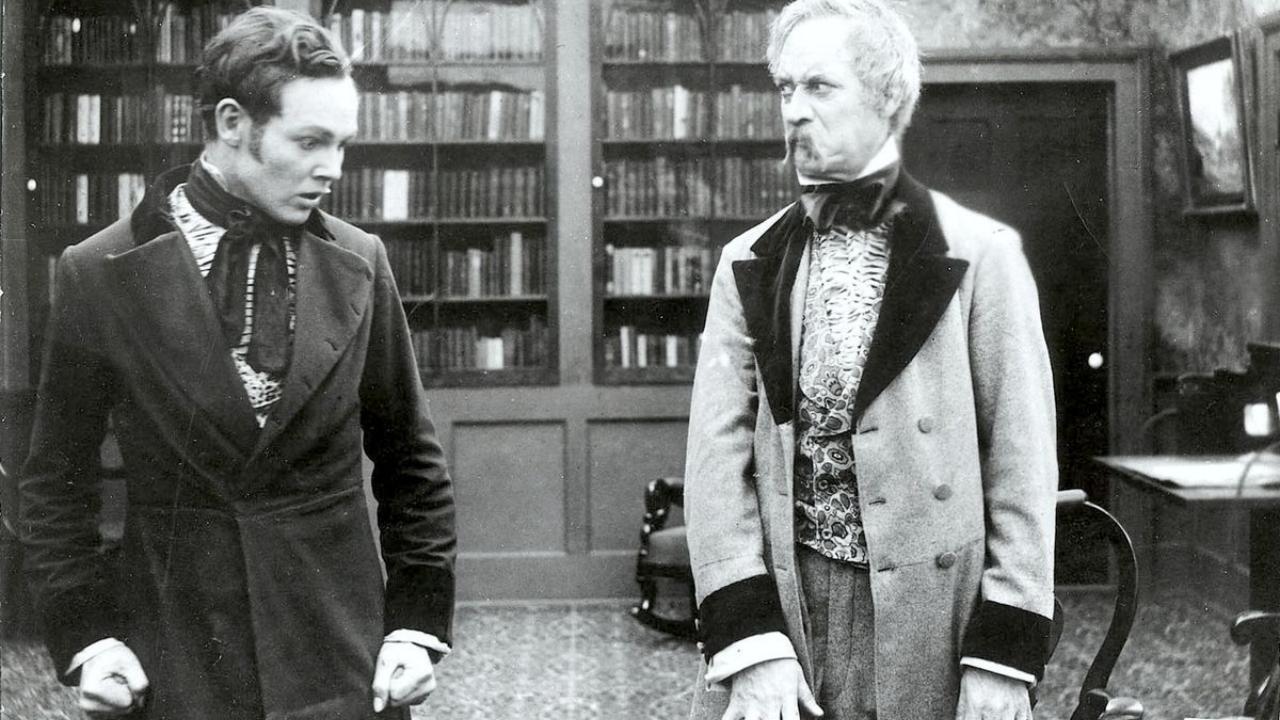Richard Chatten
The first half of this Civil War story is very conventional stuff, in which in a wave of patriotic fervour - and to impress the chicks - the young men of Virginia head for the local enlistment point to join the Confederate army. Our hero Frank Winslow, however, promptly thinks better of it, sneaks off and returns home, only to be smartly marched back at gunpoint to enlist by his Pappy, retired Colonel Jefferson Beverly Winslow.So far so predictable; and told as stiffly as the spine of Colonel Winslow (who as played by Frank Keenan frequently resembles a tailor's dummy). But the film now starts to lighten up and even develop a funny bone. The rustlings in the undergrowth of the local wildlife during Junior's first night on guard duty spook him so much he drops his rifle and scarpers for home again, provoking Pappy into the incredible decision to take Junior's place in his regiment. Nobody in Junior's regiment notices that his father had replaced him; while at that moment by remarkable coincidence a bunch of brusque Yankee officers billet themselves on the Winslow estate, discuss their latest plan of attack loud enough for Junior hiding fearfully in the room above to overhear them and - galvanised by the knowledge that he holds the fate of his company in his hands - he finally find his mojo and leaps into action.Frank gets away from the house in a sight gag worthy of Keaton and - some pretty spectacular battle footage later - Father & Son are reunited, the Winslows' family honour is restored and the South is saved. For now.
jjnxn-1
A story of the old code of family honor at the dawn of the Cibil War and the way that reluctance to throw one's life away was treated with disgrace and exile. The acting is overwrought by today's standard but mixed in with the exaggeration are some bits of touching human emotion.Seeing as the film is now one hundred years old and was made about facts that at that point were only fifty years in the past the film makers were able to have a perspective on events that is impossible to us now. As such this is a precious piece of cinema. As a movie it's a hoary old chestnut but as an historical document it's fascinating. The damage to the print actually adds to the feeling that you're watching a series of Matthew Brady daguerreotypes come to life.
Robert J. Maxwell
It's always interesting to watch silent movies, if only to see how overdone the acting tends to be. With only a few scattered printed titles, the story depends on the actors' ability to project emotions. They usually give it their all. They certainly do in this film.It's the beginning of the Civil War and all the Southern men of Cotton Creek are enlisting except Charles Ray, who decides to skip the war and hide at home among the women, the darkies, and his rigid old man. No Achilles he. He's not sulking, just scared to death and he knows it, and soon everybody else does too. His proud father, an ex colonel, played by Frank Keenan, forces Ray to enlist at gunpoint. Keenan's performance is something to behold. With every move, every change of facial expression, he seems struggling to overcome an advanced stage of rigor mortis.The story itself could have come from an early John Wayne Western. Ray deserts the army but redeems himself, just as the Young Man did in "The Red Badge of Courage." The South wins, with the help of the loyal slaves who tend the Big House. There is really only one battle scene, and it looks as if the budget was generous but it's confusingly edited. We know the Confederates won because a title tells us so. Some of the scenes are really slowly paced. We get the point long before the scene ends.Southern values usually prevail in these movies, whether it's Buster Keaton or "The Birth of a Nation". When they fail, it's shown as a tragedy, as in "Gone With the Wind." Some regional resentment still exists in the South, unlike Germany, a country in which WWII never happened. The South was settled by Cavaliers, not the Puritans of the North, and the Cavaliers brought their culture of honor with them. When something happened, you settled the score yourself. You didn't go squealing to a central government.Jefferson Davis had a hell of a time ruling the Confederacy. There were so many challenges to duels that he had to be careful to post his officers far apart from their enemies. And he had to depend on states to provide volunteer troops. He couldn't draft anyone because the whole point of the Confederacy was states rights and a weak central government. That's what a "confederacy" is -- a kind of gentleman's agreement to cooperate.In the Northern state, Charles Ray would simply have been drafted unless his father was rich enough to pay a few hundred dollars for a substitute.
MartinHafer
I think a lot of the impact of this early silence feature film is lost today, but more about that later in the review. When it was released in 1915, attitudes about plot and drama were very different than today. Predictability was expected from movies and what we would consider over-acting was the norm. Also, having white folks run around in black face playing slaves was, unfortunately, pretty widely accepted. And so, by 1915 standards, this is an exceptional movie and one of the earliest full-length films ever made. I think it is a lot better than its much-admired contemporary, BIRTH OF A NATION--which is ponderously long and one of the most racist films made in America. Unfortunately for the makers of this film, people in 1915 preferred BIRTH OF A NATION and it went on to make a ton of money and was hailed as one of the greatest films ever made. That's really a shame, because there are some exceptional aspects to this film that have been overlooked. In particular, the costumes and battle sequences are excellent (though not quite as grand as those in BIRTH OF A NATION) and the story, though very simplistic and predictable, is still compelling. And, its use of two white folks in black makeup, though appalling, is not nearly as offensive as about 90% of the other film.Now, as for today's audiences, the plot is very very dusty to say the least. Having the son be afraid of war and deserting was excellent, but the contrived way that his own father accidentally shoots and kills him in battle is so over-the-top dramatically (though not in its day). BUT, it is STILL worth seeing for its historical value. Not a great or memorable film, but one of the most watchable of the early feature-length films.


 AD
AD



